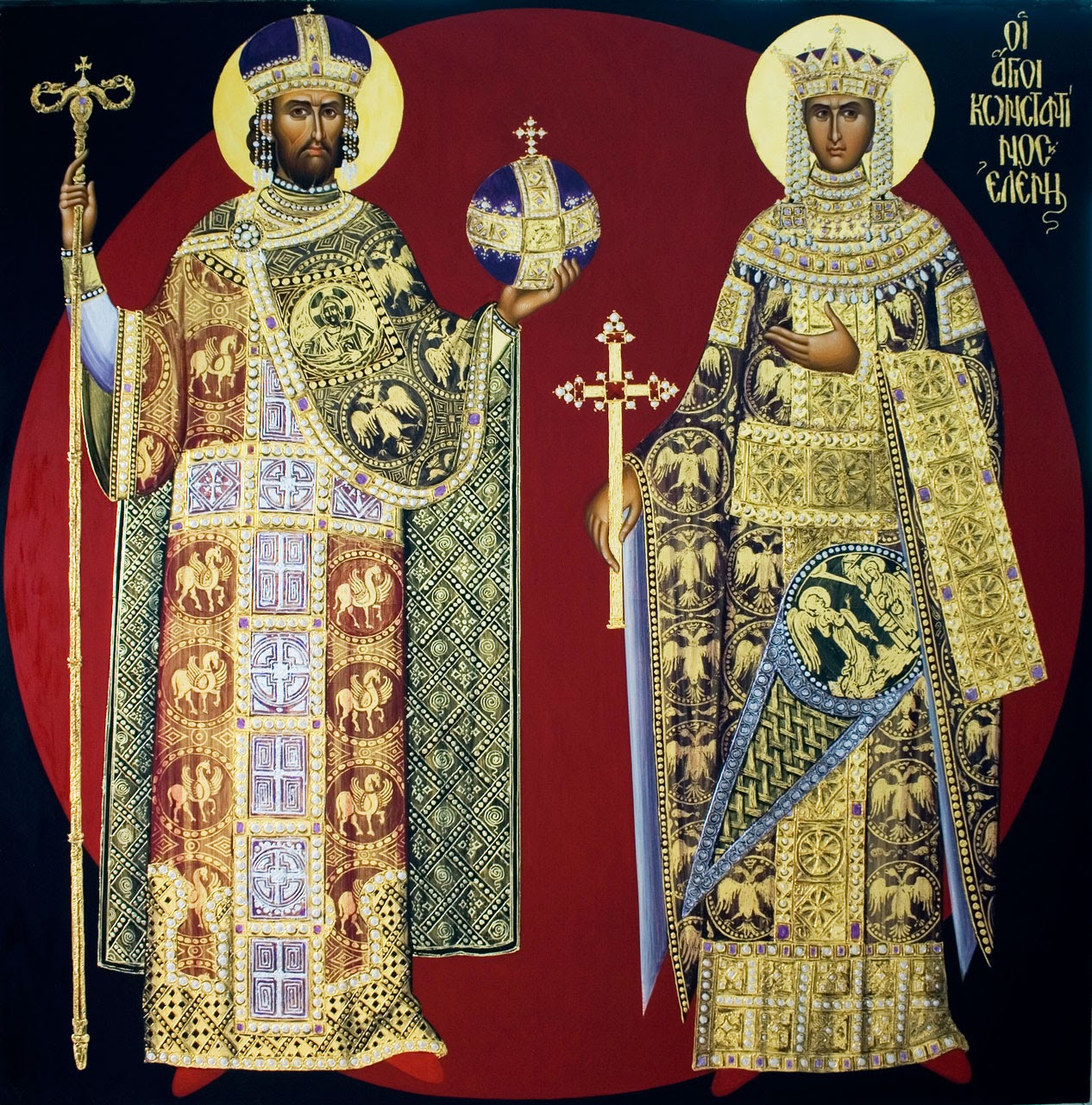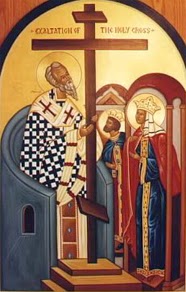The Apostles of the Cross
"We though preach Christ crucified, to the Jews indeed a scandal, but to the Greeks folly..."--1 Cor 1:23
Christ is risen! He Who was crucified for our sins has trampled death and risen again, and yet still the Cross is His sign. By His Resurrection great power was given to the Cross, and it is for this that Constantine heard: "By this sign you will conquer." And today we celebrate St. Constantine and his mother Helena, apostles of the Cross.
We laud these two saints as "Equals to the Apostles." Why do we do so? Because of their immense effect in spreading the Gospel throughout the world. On those who devotedly gave themselves to the apostolic duty of evangelization, we bestow this title, as we do to Mary Magdalane and Sts. Cyril and Methodius. What did Constantine and Helena do to earn this title?
Constantine was the Roman Emperor, and, like most Emperors, he was a pagan. Yet as he prepared for a battle with his usurper, Constantine saw a vision of a gloriously radiant Cross, and he heard these words: "By this, conquer." Because he was uncertain of what this portent meant, the next night Christ came to him in a dream and revealed His Gospel and the power of His Cross to the emperor. Constantine thus made his battle standards preach Christ Crucified: the standards had a flag hanging on the crossbar of a cross, and he had the Chi-Ro, the first two letters of Christ's name, placed on it, to declare to all the world his allegiance to the Crucified One. With this mighty standard of victory, Constantine crushed his enemies, and he came to believe in the Lord. We know he was not a perfect man, and he fell as men do, but he believed in the Lord and spread the Gospel to many through his policies, such as the Edict of Milan, which freed the Church from the frequent persecutions she had experienced until then.
What of Helena? She was the mother of Constantine, a Roman empress. She too believed in the Lord, and she loved the Crucified One so much that she sought to find the Cross on which His Blood was shed for us, hidden in Jerusalem. She undertook a pilgrimage to the Holy Land, and she found the relics of the three crosses from Calvary. Uncertain of which was the Lord's, she devised a plan: she invited an ill man to touch the crosses, and when he touched the Cross of Christ, his illness was restored. Overjoyed by the discovery, the people of Jerusalem, led by St. Makarios, venerated the Holy Cross (as we remember on September 14th), and Helena brought the crosses to Constantinople, the great city elevated by her son. From there, relics of the Cross spread the ends of the earth.
What do we learn from these two great saints? How much we are to venerate the Cross of Christ. It is a sign of the love of God for man, and it is a sign of the victory over the demons and over death Christ has achieved. Recall St. Gregory the Theologian's fiery words rebuking the devil: "Submit, / lest I strike you with the cross, before which everything trembles. / I carry a cross in my limbs, a cross on my journey, / a cross in my heart. The cross is my glory." Let us never ignore the great gift that Christ has given us in the Cross, for "whoever does not honor the cross, or insults it, insults Christ himself" (St. Nerses Shnorhali). Instead, let us emulate the great Equals to the Apostles, Sts. Constantine and Helena, and let us always bow before the All-Honorable and Life-Giving Cross. Christ is risen!
"Your Cross we venerate, O Master, and Your Holy Resurrection we glorify."
Nota Bene: The quote from St. Gregory the Theologian is from his Poems II.1.55.9-12, as found in Poems on Scripture, translated by Brian Dunkle, S.J., as volume 46 of the Popular Patristics Series (Yonkers, NY: St. Vladimir's Seminary Press, 2012).
Text ©2014 Brandon P. Otto. Licensed via CC BY-NC. Feel free to redistribute non-commercially, as long as credit is given to the author.



Comments
Post a Comment